Mouthwashing review
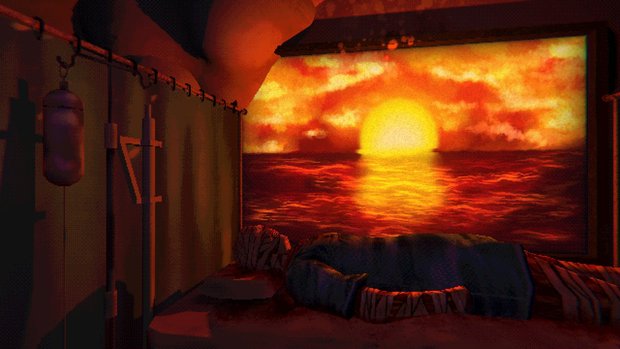
- 1 Comment
Deeply disturbing, refreshingly original and thought-provoking psychological thriller that will leave a good taste in the mouth of any sci-fi horror fan
The vastness of space has provided its fair share of horror stories. Our collective fear of the unknown can allow for all sorts of hellish nightmares to be conjured forth. Developer Wrong Organ’s Mouthwashing explores this primal fear of space by grounding itself in everyday anxieties its characters must live with: Being made obsolete. Not being good enough. Never finding your calling. Knowing that someday, everything you hold dear will come to an end and the last one to know it’s over is you. Of course, the fact that you’re starving and trapped with no one coming to save you makes these existential concerns all the more potent in this particular case. The game presents these deeply personal feelings of dread in a manner that demands a reflection of our own deepest fears, and its disturbing subject matter left me equally fascinated and terrified.
You begin Mouthwashing in the cockpit of the Pony Express long-haul space freighter Tulpar, where you are told you are about to crash into an unknown mass. You are asked by the computer system to manually turn the ship left to avoid impact with the oncoming orbital body, but rather than giving you the opportunity to proceed with this correction, the game presents two large text options: “Steer Right” or “Leave.” Something is compelling you to steer the ship directly on a collision course. You are not provided with the option to move out of harm’s way, and while you can walk away from the control console and look around the cockpit, sooner or later your only choice as the player is to turn the freighter directly into the approaching object. The computer system then flashes a bright green “WARNING” screen on the terminal, stating it has engaged autopilot to avoid a collision course. For the moment, the ship’s computer system has successfully thwarted your attempts at sabotage. You walk around the room but are still unable to leave.
Next to the control console is a large red button under a glass safety lock with a keyhole below it, and inside a nearby locker you’ll find a key. You insert the key into the keyhole and are again presented with two options: “Disengage autopilot” or “Leave.” The former will surely doom the crew to crash into the object, and yet you are drawn to that big red button you know will seal your fate. Throwing all sense of caution aside, you press it and the warning screen now flashes “CRASH IMMINENT” in a deep red font. Only now, having irreversibly doomed your ship to crash, are you finally allowed to leave the cockpit, sirens blaring and red lights flashing all around you. You start running, only to find that the long, claustrophobic tunnels of your ship seem to go on forever. You turn around to discover that your path has been closed off behind you. You turn around once more to see a life-sized figure of your company’s cartoon horse mascot Polle now blocking your path. You try to run and find the path behind you is no longer closed, but before you get too far you are blocked by Polle once more. You run again. More hall transformations with Polle blocking your path, this time looking somewhat disfigured and horrific. Then everything goes white.
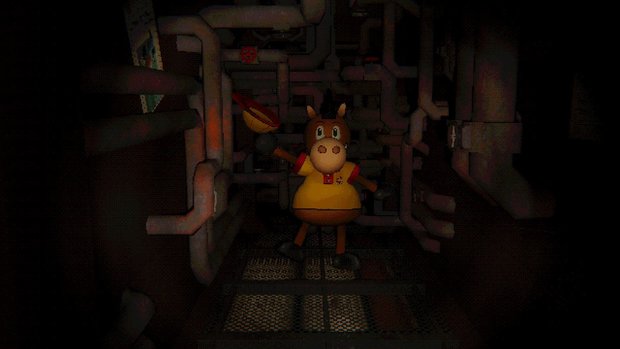
These first few minutes of Mouthwashing set the stage for the rest of the game. The entirety of the game’s 2-3 hour runtime takes place aboard the Tulpar, one of many ships in the company’s fleet that deliver cargo from one location to another across the vastness of outer space. Told through a nonlinear narrative, the game will typically display a time stamp upon loading an area, letting you know if it’s set before or after the crash that you personally set into motion. Before the crash, you take up the role of Captain Curly – decorated leader and generally well regarded by everyone aboard the Tulpar. After the crash, you are Jimmy – previously co-pilot and now acting ship’s captain. When starting as Jimmy, it is quickly revealed that while Curly survived the crash, he now lies in the medical bay horribly mangled and barely clinging to life behind a thin layer of bandages – his only visible features being one always open, lidless eye and his lipless mouth displaying a constant toothy grin. He lies there, unable to move or speak to his reasons for apparently attempting to kill everyone on board through his act of sabotage. Why would someone as beloved as Captain Curly want to cut short the lives of everyone on the Tulpar? This is one of several central mysteries you will slowly unravel.
Joining Curly and Jimmy on board are the three other members of the crew: Anya is the soft-spoken medical officer; Swansea is the no-nonsense, well-versed engineer; and Daisuke is a young, inexperienced intern studying under Swansea. Mouthwashing keeps its cast of characters to these five with a laser-focused narrative that allows for a deep analysis of every individual on the ship. You will constantly be thrown between developments in the past and the present: Curly’s sections give insight into what daily life should be like aboard the space freighter. You’ll reminisce with Anya about the many deliveries undertaken by the Tulpar, or you’ll have a casual conversation with Jimmy about life back home. This is in stark contrast to playing as Jimmy, as you watch the freighter’s increasingly decrepit interiors mirror the crew’s dwindling resources and growing desperation. While I thought this approach would prove confusing at first, the story is told in such a way that you are given exactly enough information to make your own deductions about what is going on at any particular place in time. The style of storytelling consistently evokes the work of David Lynch, leaving a dreamlike vibe through character interactions and story beats.
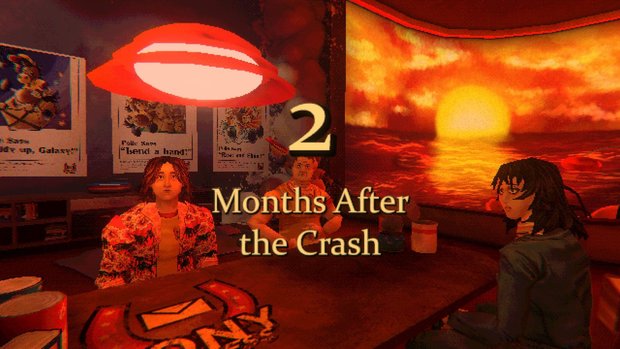
After the crash, the ship is no longer mobile and is only able to sustain its life support systems, along with some various electronics. One of these is thankfully a food dispenser loaded with rations. Unfortunately, there is a limited amount of food left and it quickly becomes apparent that if a plan isn’t formed about how to arrange a rescue then everyone on the Tulpar is going to starve. At first the crew is relatively optimistic about their situation and think they can wait it out until the Pony Express sends some help – after all, the company must have some kind of contingency plan for when their valuable employees are marooned in space, right? But as time goes on there’s an unshakable feeling that maybe no one is coming to save them after all. Their mental states change to reflect this waning optimism as well – one of the early objectives as Jimmy is to give Curly painkillers, since Anya is too shaken up to perform her duties as the ship’s medical officer. Swansea will start out working hard to keep the remaining equipment on the freighter in functioning order, but as time passes you’ll find him lounging around and allowing the remaining equipment to fall into disrepair.
As the situation continues to delve into madness, the relationships among the crew follow suit – who can you trust, and who would stab you in the back if it meant one less mouth to feed? Mouthwashing plunges into the depths of our worst selves to beautifully depict how these inner demons can bubble to the surface when we’re pushed hard enough into the realm of desperation. The story also asks big questions about our relevance as humans as everything becomes increasingly automated. The Pony Express is the last freighter company that still has manned flights, holding out against an industry that has moved past the need for people to deliver supplies. Why spend resources to keep a flesh-and-blood crew happy and healthy on long multi-month excursions across space when you can automate the process instead? The game leaves such questions open for you to ponder and interpret yourself, which ultimately works way better than trying to shove an answer in your face.
The world of Mouthwashing is presented through a deliberately low-poly 3D aesthetic, highly reminiscent of the days of the original PlayStation. The interiors of the Tulpar are cramped and lined with dull chrome machinery, with long industrial hallways connecting to larger rooms where the crew members reside. A standout setting is the lounge, where the ship’s kitchen and dining room are located; along one wall is a huge projection screen of a sun that changes to a starry sky depending on the time of day. Prior to the crash the corridors are bright and in working condition, but those same hallways post-crash are dimly lit through backup lights giving off a reddish glow, with large sections covered with sealant white foam that is the only thing keeping the hull of the ship from being exposed to the vacuum of space. Along the walls of every room you will find company posters with a cartoon drawing of the Pony Express mascot Polle cheerfully exclaiming such phrases as “Lend a hand!” or “Rise and shine!” Various moments throughout will make use of archival advertising footage and public domain cartoons. There is a constant melding of outer space’s cold obliviousness regarding the plight of the Tulpar with the endless assault of corporate propaganda and simulated comforts like the fake sunbathing the lounge in its hazy glow.
The sound design and music are Mouthwashing’s strongest aspects by far. Whenever there’s a transition from pre-collision to post-collision or vice versa, the interface will begin freezing up and the sound will start getting choppy and harsh as if the game itself is about to crash. None of the Tulpar’s five crew members have spoken dialogue, with interactions playing out via text on-screen. The only “character” that is fully voiced is a life-sized figure of Polle in the lounge, who will constantly spout whimsical phrases starting with “Polle says…” But there are some sequences where you will watch the screen fade to black, and suddenly you will hear horrific guttural gurgling or other grisly sounds with no music playing in the background at all. Speaking of which, the incredible electronic score will pound sharp industrial speaker feedback through your ears at one moment, only to then play an emotional piece highly reminiscent of Vangelis’s timeless “Blade Runner Blues” the next. There is a pervading sense of sadness mixed with anger throughout the score, and I was incredibly impressed with the variety of tracks for the game’s relatively short runtime.
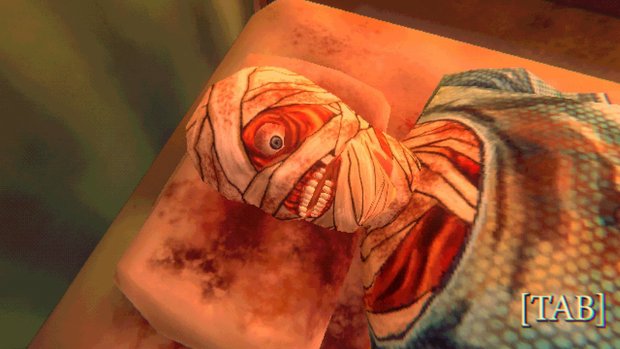
The majority of your time will be spent walking through the Tulpar and conversing with the other members of the crew to satisfy objectives, such as talking to Swansea about the location of a hand axe that could help chip away some of the foam blocking your progress. The ship interiors can start to look the same with their industrial metal designs, but thankfully there are helpful room signs on the walls. The controls keep things simple: You play in a first-person perspective, with free 3D movement handled through the WASD keys and mouse. Hitting TAB will bring up your inventory, holding SHIFT will make you run, left-clicking hotspots will interact with objects or talk with people, and holding down the right mouse button will zoom in your view. You will collect items through the course of the game, but most are used for one puzzle each and act more as checkpoints between story sequences than difficult brain teasers.
One of the main items you will pick up is a blacklight device that serves as the captain’s all-access pass and reveals special codes in the ship that were designed to only be seen by whoever’s in charge. One such code reveals the access key to the artificial sweeteners in the lounge, which serves to both provide some light puzzle solving along with intriguing worldbuilding on what the Pony Express deems necessary to be kept locked away. You will receive a notification at the top left of your screen whenever a new objective pops up, and you can check your current goal at any time from the inventory menu.
Then there’s the stealth and action set piece sections, which are my main criticism of the gameplay experience. There are not many sequences of this kind in the game, which largely allows you to progress the story at your own pace. But when you’re suddenly asked to sneak across a rafter while being stalked by some unknown entity that will chase you down if you’re spotted, it feels like you’re playing a completely different game. Without spoiling why, these sections typically involve horrific monstrosities that are terrifying to witness – but if you get caught multiple times and are brought face to face with these terrors they quickly lose their scare factor. Another section requires you to take up a gun to fight off an assailant while avoiding them in a maze, and while it does not last very long, it asks you to learn a completely different set of rules and brings light gunplay into an otherwise combat-less experience.
I don’t have a problem with shaking things up by trying something new, and the need for stealth and combat makes sense in the context of what is going on at these points in the game, but the whiplash I felt when going from a dreamlike nightmare through the lives of the Tulpar’s crew struggling to survive to having to slowly creep my way through a sizable stealth scenario was significant. You will receive small hints about how to progress through these sections, and if you do get caught the game simply returns you back to the beginning of wherever that sequence began, but these scenes killed the pacing for me whenever they came up.
Final Verdict
Mouthwashing is one of the finest horror adventure games I have played in recent memory. The graphical style, music, sound design, and art direction all work in tandem to set a bleak scene of despair that ends with a hard-hitting emotional gut punch of a conclusion that is left intentionally ambiguous. With a small cast of characters, this is a tightly focused narrative experience that puts you into their shoes to feel the same desperation they’re feeling in the horrible situation they find themselves in. The chase sequences are a bit disappointing when compared to the more thoughtful storytelling of the rest of the game, but they are so infrequent that they serve as minor annoyances rather than a deal-breaker. This is not a game for the squeamish, and be sure to be in a good mental space before tackling Mouthwashing’s brutally bleak subject matter. But for anyone looking for a truly unique horror adventure, this is one nightmare worth the ride.
Hot take
Mouthwashing is an incredibly visceral sci-fi horror experience that delves into the dark abyss of the human condition, and the few short hours you spend with its stranded space crew will chill you to your core.
Pros
- Deeply unsettling narrative that braves uncomfortable subject matter
- Gorgeous low-poly graphical aesthetic
- Memorable characters with realistic motivations
- Incredible soundtrack and audio design that is equally haunting and beautiful
Cons
- Stealth and combat set piece sections feel incongruent with the rest of the game
- Simple puzzles that serve more as checkpoints than brain teasers
Sam played Mouthwashing on PC using a review code provided by the game's publisher.





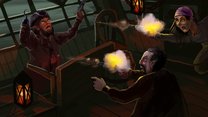





1 Comment
Want to join the discussion? Leave a comment as guest, sign in or register in our forums.
This game has been trending but it's hard to recommend it on this site. It's hardly an adventure game (i.e. classic formula or modern but cleverly pushing the boundaries of the format). At its core, it's a very short walking simulator with very little gameplay (you know, where you use your brain). The story would be interesting as a stand alone film alongside its possible inspirations (e.g. Sunshine, Event Horizon), but the gameplay is little more than constantly running around dream shifting corridors fetching inventory items with a basic use. The complex sections are little more than mixing a cake recipe and tedious on rails horror trial and error sequences. This kind of horror game has been done to death in recent years (e.g. P.T.). I liked the PS1 low poly aesthetic but if you want to play a similar adventure game with more involving gameplay and good puzzles, I recommend The Tartarus Key. If you want a similar adventure game with intense psychological themes based around the sins of the protagonist and better puzzles, I recommend The Night is Grey. If you're still curious, save your time and watch a let's play on YouTube.
Reply
Leave a comment